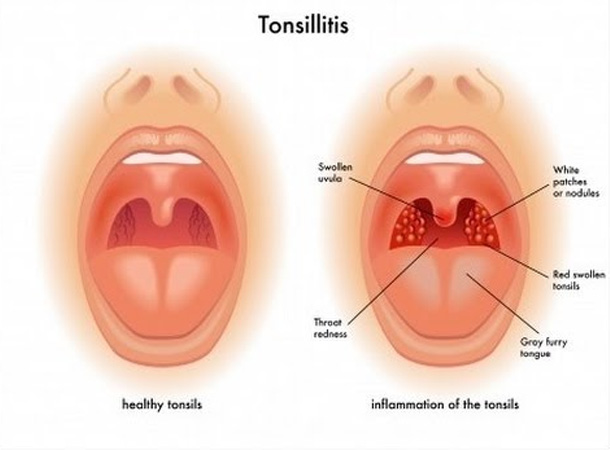Simply put, tonsillitis is the inflammation of the tonsils which consist of a pair of lymph nodes situated at the back of your throat, one on each side. Working to prevent microbes from entering your body, the tonsils are not impervious to getting infected from time to time. Anyone can get tonsillitis, although it is very common in children.
Tonsillitis is caused by different kinds of bacteria and viruses. However, the most common culprit behind the problem is the streptococcus bacteria or more commonly known as strep. Some of the common signs and symptoms of tonsillitis are:
• Sore throat
• Red tonsils with white or yellow spots
• Painful or difficulty in swallowing
• Raspy voice
• Bad breath
• Fever
• Chills
• Headache
• Tenderness of the neck and jaw
It’s important to note that tonsillitis is a contagious disease. If left untreated, it may lead to complications such as middle ear infection, rheumatic fever and obstructive sleep apnea. There are different medical treatments and home remedies available for tonsillitis. Read on to get to know them.
Medical Treatments
A physical examination of the throat, a throat culture, and considering the signs and symptoms allow a doctor to determine whether or not you have tonsillitis. In mild cases, such as something brought about by the common cold, the condition requires no medical treatment. However, the following may be warranted if you are having a bout of severe tonsillitis:
• Administration of antibiotics: If the problem is caused by a bacterial infection, your doctor is likely to prescribe antibiotics. It’s a must for you to complete the course of the treatment in order to prevent the development of a more powerful bacteria strain that may be resistant to low doses of antibiotics. It’s not unlikely for your doctor to schedule a follow-up examination in order to determine if the treatment via antibiotics was effective.
• Surgical removal of the tonsils: In medical terms, tonsillectomy is the word used to refer to the removal of the tonsils surgically. In the past, it’s a very common procedure. These days, however, doctors prefer to recommend it only for individuals who experience tonsillitis repeatedly. Tonsillectomy is also ideal for those who fail to respond to other medical treatments or are at risk of the complications of tonsillitis.
Home Remedies
Just like what’s mentioned earlier, mild cases of tonsillitis do not require medical treatments. There are home remedies that are known to help deal with the various symptoms of the condition as well as keep in check the infection. Opting for these home remedies is also ideal for those who wish to dodge the common side effects of antibiotics, such as diarrhea, vomiting, nausea, abdominal discomfort and rash. Here they are:
• Lemon juice: Consuming lemon juice helps flood the body with vitamin C, a nutrient that helps boost the immune system. It’s a good idea to opt for freshly-squeezed lemon juice and without any added sugar.
• Honey: Thanks to its superb antimicrobial properties, honey can put an end to your tonsillitis in no time. All you have to do is dissolve up to 4 tablespoons of pure honey in a glass of water. Take the mix 2 to 3 times per day.
• Turmeric: Adding a pinch of turmeric in a glass of warm milk allows for the creation of a super effective home remedy for tonsillitis. Turmeric is a spice known to possess impressive antimicrobial and anti-inflammatory properties.
• Ginger tea: Many people swear by the effectiveness of ginger tea in dealing with tonsillitis. That’s because ginger is capable of suppressing both inflammation as well as microbial proliferation. To make a cup of this anti-tonsillitis beverage, simple crush a small cube of ginger and allow it to steep in a cup of boiling water for a few minutes.
• Onion juice: Gargling with the juice extracted from chopped up onions is a wonderful way to treat tonsillitis. It doesn’t come as a surprise because onions are known for their amazing antimicrobial properties.














